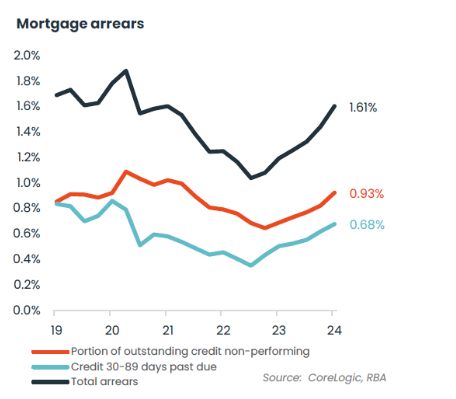
The Australian share market once again closed the month 0.5% higher, with the All-Ordinaries index closing June at 8,013.8 points (a solid gain of 8.3% for the 2023/24 financial year). The Australian dollar remained steady for the month, with 1 Australian Dollar currently buying 66.79 United States cents.
Global share market returns were mixed in June, with the United States Dow Jones Index gaining by 1.1%, the London FTSE falling by 1.3%, the Japan Nikkei 225 gaining by 2.8%, and the Hong Kong Hang Seng Index falling by 2.0% for the month.
The Reserve Bank of Australia (RBA) board kept the RBA target Cash Rate on hold at 4.35% per annum in its June meeting. Another higher-than-expected inflation result in the month now sees markets pricing “a 33% chance” that the RBA board will increase rates when they next meet in August.
During the month, it was revealed that mortgage arrears have risen from the COVID-19 lows, with the portion of loans falling behind on their repayment schedules now higher than at the onset of COVID-19.

The key factors resulting in the higher mortgage arrears are the sharp increase in interest rates, along with cost-of-living pressure due to high inflation. Although if mortgage arrears are increasing while inflation remains high, what does this say about the effectiveness of the RBA monetary policy?
It is clear to me that the Australian economy is delicately placed, and I expect mortgage arrears to only increase as households utilise any cash reserves and contingency funds before being in arrears in their mortgage.
If there is any uptick in unemployment, there could be a sudden shift in focus of the RBA board from controlling inflation to preventing a deep recession.
If you have questions, please contact Ryan Love on 1300 856 338.
This article is general information only and is not intended to be a recommendation. We strongly recommend you seek advice from your financial adviser as to whether this information is appropriate to your needs, financial situation, and investment objectives.
